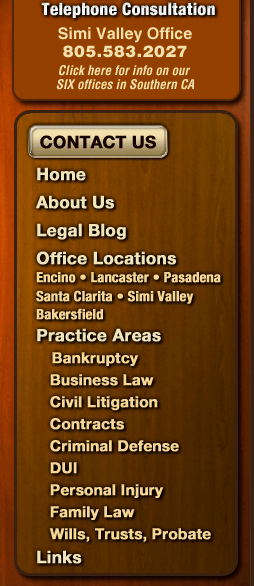Our Simi Valley, CA law offices handle divorce, legal separation, modification, custody, support, paternity, adoption and guardianship proceedings. This includes some contractual work such as prenuptial agreements. The Family Law Department also handles Children's Court or DCS cases.
California is a no-fault divorce state.
The court does not care why you are getting divorced. They will usually refuse to hear the nasty reasons for the divorce. Sometimes if these reasons have a bearing on the well being of the children they can still get in.
California has a cooling off period.
Therefore no matter how fast your lawyer works, California requires a minimum of six months to pass after the spouse is served with the divorce paperwork. With other time factors this may mean it will take you about seven months to have your divorce finalized from the time you see the attorney. Complicated divorces may take more time but a motion can be made to terminate the divorce itself even though other issues will be decided at a later date.
California is a
community property state.
This means that all income you or your spouse earn from the time that you marry until the time you separate and all purchase and expenditures during that time are generally equally owned and owed by the two of you. Some exceptions to community property would be property that you had prior to the marriage that you can still track and gifts or inheritances during the marriage that you can still track. A Pre-Nuptual Agreement may be utilized to protect what otherwise might be considered community property or perhaps even to limit or eliminate spousal support (alimony).

California will consider awarding child support and spousal support (alimony).
Spousal support is generally based on the length of the marriage and the relative incomes and earning capacities of the parties.
Custody of Minors
California law does not give either the mom or dad any legal advantage in obtaining custody of the children. Mothers get custody more often than dads for a number of reasons.
They are more often and by tradition the primary care taker - especially when they are a stay at home mom. The child is very young and still being breast fed. The father doesn't fight the issue. The particular judge or commissioner hearing the case has some personal bias. The court does not generally look at the relative incomes of the parties as it will make an adjustment via the award of child support. Fathers do get custody in a substantial number of cases.
Factors the court looks into revolve around the question of what is in the best interest of the child. This may lead the court to look at the family history - who has been the primary care taker. The status quo - what is the existing situation regarding custody and visitation and how long has it existed. Abuses - is either parent abusive. Stability of the parent. Drug use, medical and mental conditions - these may effect custody decisions. As the children get older they too will have an input in custody decisions.
Convictions of domestic violence or charges of sexual abuse may be determinative.
When there is a child custody dispute there will be a conciliation hearing. The court conciliator tries to get the parents to work out an agreement on custody and visitation without the attorneys. In hotly disputed custody cases there may be a child custody investigator appointed or even a psychologist or psychiatrist involved.
Child Support
California has guidelines based on the income of the parties and the amount of time they have with the children to determine what child support should be. In addition to basic child support the court will normally order continuation of insurance, a division of excess medical bills, and contributions to child care when needed. Support normally continues until the child is eighteen or if still in high school until nineteen.
Children's Court
Children’s Court is different than any other type of court in California. In Children’s Court, they can take away your children or restrict your right to see your own children. Cases may begin by officers or representatives of the Department of Children and Family Services (DCFS) barging into your home in the middle of the night to take your children away. They may do this based on a conclusion from a social worker based on hearsay or other unreliable sources.
As a parent or guardian, you are often faced with the problem of disproving allegations. Often, you will be asked to sign agreements to allow them to appoint an attorney who works in Children’s Court to represent you. You will usually have very little time in which to make a decision which might seriously affect your family. You should consult with an independent attorney who does Children’s Court work prior to making any decisions in these matters.

WARNINGS:
Before you leave the family home or give any substantial money to your spouse because of a separation or pending divorce, you should work out a marriage settlement agreement with an attorney. Divorces are often bitter, beware of being set up for domestic violence or child abuse cases. No matter why you are getting the divorce recognize that you still need to work at least a little with the other party so try to be civil, remember the relationship is at an end so whatever was wrong with the other party you will soon not have to deal with it on a daily basis. Child custody and child and spousal support are modifiable on a change of circumstances. No matter what you agree to in terms of child support and custody, some day things may change.
Pension plans acquired during marriage are usually considered community property.
Anticipate what might happen in advance. The court often enforces the existing situation, so make sure you are in the position most advantages to yourself. You may have heard the statement that possession is 9/10 of the law. While it may not be the law it may be difficult or too expensive to change it - so get what you want at an early stage. If you have accounts that you or your spouse can take control over either tie these accounts up or put them in your name pending orders from the court.
LEGAL SEPARATION
Legal separation is similar to a divorce. You still divide property and resolve the issues of custody and support. The paperwork is almost the same. In the end however you are not divorced. If you want to later become divorced you may have to file a divorce petition and start the process anew.
People may choose Legal Separation for a number of reasons. There may be religious reasons - divorce is unacceptable. Sometimes there are insurance reasons - insurance may continue as long as the parties are legally married. Perhaps it might be that there is still hope of a reconciliation.
If the person that files wants a Legal Separation and the responding party wants a divorce, the responding party can ask for a divorce in the response.
These cases fall somewhere between the civil court where divorces take place and criminal courts. Often in hotly contested custody battles allegations are made that generate a children's court hearing. Decisions regarding custody, visitation and placement made in Children's court control over what might have been the order in the family law court.
Although Judges in Childrens Court are not empowered to convict someone of a criminal offense, charges made in these courts as well as information gathered often lead to a criminal prosecution.
Many people think that these courts only concern themselves with serious abuse - the sensational news stories of kids being locked up in a closet without food or being tortured in some horrendous manner. The fact is that a case may be started simply because someone does not like the way you discipline your child - even spanking may be unacceptable. Or someone may claim that your child is neglected. Sometimes the child may have received an injury and even though it was through some sport or at some other location they suspect you.
Surprisingly you have very few rights when it comes to your own children. With what many lawyers believe is very flimsy information your children can be taken away from you. Often you may not hear about it right away - sometimes not even until after the first hearing. The Department may be willing to place the children in a relatives home. For many it may be months or years before children are returned to their parents - if at all.
Because children are so precious to parents, parents will do about anything to get their children back. Often this leads to the parents being taken advantage of and the parents are compelled by the Department to agree to things or sign documents that should not be done. Usually, the parents don't have enough time to obtain a private attorney before the first hearing and then are led by the court appointed attorney to do things which may not be in their best interest. You should think twice about relying on any promise made to you. Later it may be denied that a promise was ever given.
Beware that since the investigators and the personnel at the Department have so much power it is a mistake to antagonize them even when they are wrong.
Children's Court works far differently than most courts. Even though rules of law apply, you don't get a jury and the Judge will often follow the recommendations of the Department on what many people may feel is scant evidence. You may get the feeling that you have to prove your innocence and this often is an uphill battle given the prejudices and the prejudgments rendered by others.

|


